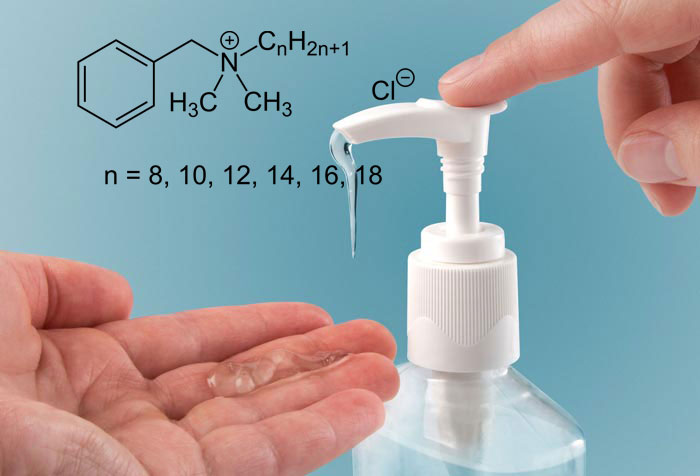Benzalkonium Chloride
Benzalkonium Chloride
Benzalkonium chloride is a type of cationic surfactant that is considered a non-oxidative biocide. This biocide is based on quaternary ammonium compounds, which are effective even in low concentrations.
This biocide is soluble in water and is effective in preventing the activity of some vital bacterial enzymes (enzymes involved in glycolysis respiration), as well as releasing the contents of the bacteria into the environment. By increasing the contact time and concentration of the biocide, compounds containing nitrogen and phosphorus in the bacterial cell enter the surrounding environment, and thus the bacteria are destroyed. This material has the property of dispersing, spreading, and destroying sludge and algae.
Using this biocide may cause foaming. In order to make this biocide more effective, it is recommended to use it together with non-oxidizing isothiazolinone biocide.
This biocide can be used in all open or closed-circuit cooling and cooling systems, firefighting systems, ponds and pools, water transmission lines, etc.
Equipment and containers should be made of stainless steel, 316 steel, 304 steel, polypropylene, polyethylene, PVC, or Teflon.
Advantages of benzalkonium chloride
- It has a wide range of applications.
- The product is liquid and easy to use. (injection)
- It has a good spreading property, which means it is an effective dispersant.
- Its effectiveness in a different range of pH.
Benzalkonium chloride (BAC, BAK, BKC, BZK), known as alkylidene methyl benzyl ammonium chloride (ADBAC), is a type of cationic surfactant. It is an organic salt classified as a quaternary ammonium compound. ADBACs are used in three main categories: as a biocide, cationic surfactant, and phase transfer agent. methylammonium.
Solubility and physical properties of benzalkonium chloride
Depending on the purity, benzalkonium chloride ranges from colorless to pale yellow (impure). Benzalkonium chloride is easily soluble in ethanol and acetone, but its solubility is slower in water. Its aqueous solutions should be neutral to slightly alkaline. Concentrated solutions have a bitter taste and a faint smell like almonds. Standard concentrates are produced as 50% and 80% by-weight solutions. A 50% solution is completely blue.
Other names of dimethyl benzalkonium chloride
Benzalkonium chlorides (BACs), also known as alkyl dimethyl benzyl ammonium chlorides, quaternary alkyl dimethyl (phenylmethyl) ammonium chlorides, quartz disinfectants, BACs, benzalkonium chlorides, and QACs.
Properties of dimethyl benzalkonium chloride
Benzalkonium chlorides (BAC) due to their broad-spectrum antimicrobial properties against bacteria, fungi, and viruses. Benzalkonium chloride is a broad-spectrum quaternary ammonium antibacterial agent. This material is cationically charged and creates an antibacterial effect by absorbing the negatively charged bacterial membrane.
Gram-positive bacteria are generally more sensitive than gram-negative bacteria. Its activity depends on the concentration of surfactant and also on the concentration of bacteria at the moment of injection. Activity is largely unaffected by pH but increases significantly at higher temperatures and longer exposure times.
Click on the link below to read more:

Comments
Post a Comment